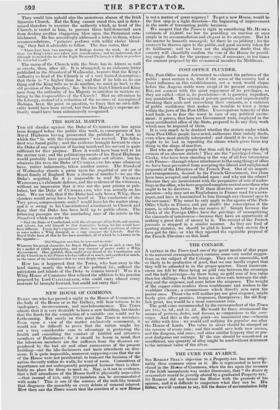THE ROYAL MARTYR.
THE oh! slander against the Duke of CUMBERLAND has again been dragged before the public this week, in consequence of his Royal Highness having prosecuted the publisher of a book in which the "lie with the circumstance" was revived. The defen- dant was found guilty ; and the evidence brought forward to clear the Duke of any suspicion of having murdered his servant is quite sufficient for that purpose. Here it would have been well to let the matter rest; and the political opponents of his Royal Highness would probably have passed over the matter sub silentio ; but his admirers (for even the Duke of CUMBERLAND has some admirers) have, rather indiscreetly, taken another course. The Standard of Wednesday chants a pasan upon the acquittal of one of the Royal family of England from a charge of' murder !—we say the Duke's acquittal, for it is impossible to read Sir CHARLES WETHERELL'S elaborate defence, and the evidence of the witnesses, without an impression that it was not the poor printer or pub- lisher, but the Duke of CUMBERLAND, who was actually on his trial. We are told, that if the Duke had only been a IV hig, these slanders would never have been heard of. The conductors of the Tory press, compassionate souls! would have let the matter sleep; and it is owing to his Constitutional attachment to Church and King that the Duke has been held up to public odium. The following passages are the concluding ones of the article in the Standard which we refer to.
" Had the Duke of Cumberland, with the advantages of Ids birth, and station, and talents, but sold himself to that destructive faction, his fate would have been different. Every day's experience shows Low small a im,dieum of virtue or sense makes a Whig demigod, or a sage amongst the Liberals. Had the Royal Duke been all that he has been described, all of which he is known to be the opposite—
'Did Whiggism own him, he were such no more Whatever his actual character, his Royal Highness might in such a ease, bid for a surfeit of rabble popularity, and any amount of power under a Whig Government. How grateful, then, ought every friend of the Constitution and of the Church be to the Prince who has suffered so much, and sacrificed so much, in the cause of the institutions that we most deeply venerate?"
How has it happened that the Tories, who bore sway in the land during nearly the whole of his political life, suffered the patriotism and talents of the Duke to remain buried? Was it a Whig House of Commons that refused the addition to his pension proposed by Lord CASTLEREAGH, who could carry ahnost every measure he brought forward, but could not carry that?
















 Previous page
Previous page